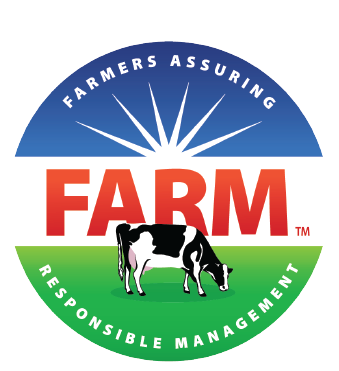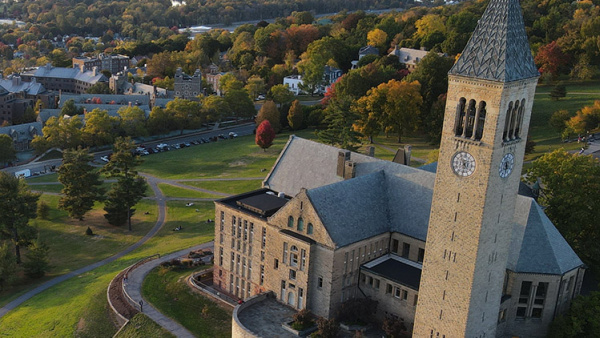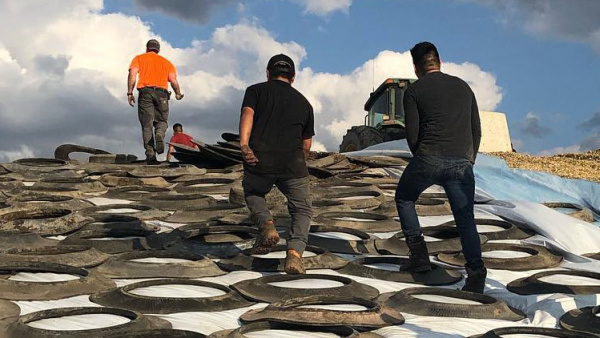- About
- Key Issues
Labor & Rural Policy
Sustainability
Animal Health
Nutrition & Food Safety
Labeling & Standards
- Programs & Resources
- Advocacy
- News
- Membership
- Events
- Stay Informed
- Contact
Ivy Lakes Dairy
Stanley, New York


Some college acquaintances fade away, into memories of a lecture hall or a dormitory roommate. But sometimes they can turn into lifelong friends – and other times, lifelong business partners. This is the case at Ivy Lakes Dairy in Stanley, NY, where Cornell classmates Austin Copenhaver, Garrett Eiholzer, and Clayton Wood now run the dairy together with all three of their families.
For the Copenhavers, the Eiholzers, and the Woods, teamwork and collaboration rule the day as they milk a herd of 1,000 Holsteins, a Jersey or two, and the odd Brown Swiss.

The diverse milking herd and contemporary ownership setup are just a few elements of what Abbey Copenhaver, RDN, CDN says are integral to the dairy’s operation. Abbey and her husband, Austin, are one of three couples who are business partners with Todd and Nori Hathorn, the former full owners of the dairy.
“We went to college with the others at Cornell. We would talk about someday starting a dairy together and eventually, it actually worked out,” Copenhaver says. “A few years after school, an opportunity came up with Hathorn who was looking for a succession plan. Now, he is still involved as a fourth, we call him our senior partner.”
The three young couples began farming together in 2013, the tail end of a bad cycle in the milk economy – an experience that taught them lessons about working with small margins and running a tight ship financially. They began taking over the dairy from Hathorn in 2014, continuing to apply those lessons through the lean years ahead in a way that made the unique challenges of 2020 seem more manageable.
“When COVID-19 happened, we already felt like we were in a good position management-wise, this situation was familiar to us” Copenhaver says. “We are taking care of the farm and taking care of our employees, and we didn’t feel like we had to change much. It was still really stressful, but we weren’t affected as much as maybe some other herds were.”
The three partner couples rely on the National FARM Program through their cooperative, Dairy Farmers of America (DFA), to help show consumers the high standards they keep for their cows.
Copenhaver says the program reinforces the fact that continued improvements to animal care result in increased herd longevity and improved comfort, as well as better leg health and soundness. And while taking care of the farm and taking care of the cows isn’t particularly unique to Ivy Lakes, how they integrate sustainability into every action on the farm is what sets them apart.
Instead of a novel project or big-ticket investment innovation, the approach at Ivy Lakes is a bit more nuanced.
“For us, the biggest sustainability initiative is probably teamwork,” Copenhaver says. “In order to make sure that we’re making sustainable decisions and we’re looking at every little detail, whether it’s a parlor routine or spreading manure, we need to make sure that everyone is on the same page and understands what the overall goal is.”
Ivy Lakes uses a manure separator where the manure solids go into compost bedding and
the liquids are directly injected into the fields with the help of their forage grower. This reduces runoff concerns and further enforces the importance of teamwork in their sustainability strategy.
Copenhaver is a practicing dietitian (RDN), and when off-the-farm clients ask about what the dairy industry and Ivy Lakes does for the environment, she uses her platform to communicate about how efficiently water is used through intentional reuse and recycling processes.
She says those conversations are at premium on the farm as well.
“We have really good communication, we’re talking to each other constantly, we’re pitching in and helping out, and also communicating with our employees to help them understand the why behind what we’re doing,” Copenhaver says.
Having that open communication among the entire workforce is critical to Ivy Lakes’ success. The majority of their 13-person staff speaks Spanish.
Libby Eiholzer is a bilingual dairy specialist with a regional team of Cornell Cooperative Extension. She helps her husband, Garrett, and Austin – who both speak Spanish as well – with workforce management at Ivy Lakes, even helping to develop some of the resources used for FARM Workforce Development.
“Through my role in extension over the last few years, I have spent more and more time focusing on employee management and different strategies for helping farmers improve the way they understand and relate with, manage and communicate with their workforce,” Eiholzer says.
Eiholzer spent two years in Guatemala with the Peace Corps after graduating from Cornell in 2009 and has built a unique connection with the families working on the farm. That trust has been especially valuable when local COVID-19 information hasn’t been available in Spanish.
“In the beginning we tried to overly communicate with our employees about coronavirus,” Eiholzer says. “Our Hispanic employees weren’t watching the local news because it’s not in Spanish, so we took the time to translate credible sources.”
To keep the workforce healthy and informed, health screening questions were posted at the time clock. Cleaning and disinfecting became a top priority at the dairy and masks were provided immediately.

While physical health is of the upmost importance, sense of community and self-care is also big at Ivy Lakes.
When longtime employees depart, everyone on the farm celebrates their service. When the workday ends, the partners spend time as friends. Copenhaver says she wishes it was easier for farmers to find space for themselves among dairy’s demands.
“I want to thank other farmers for what they do. I know firsthand that it’s a lot of work and for that reason, I want to make sure they’re taking care of themselves too,” Copenhaver says. “If we don’t take care of ourselves, we can’t take excellent care of our cows”